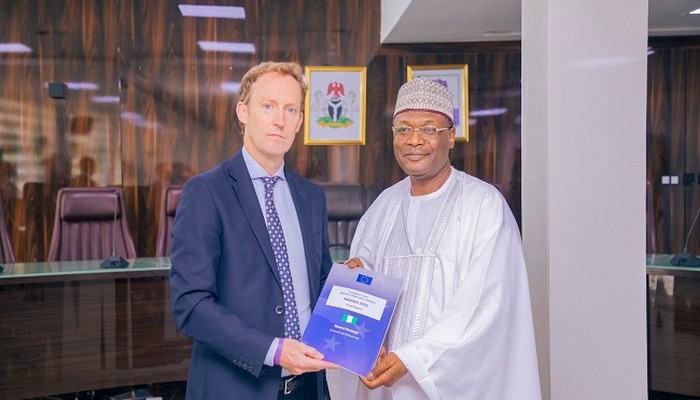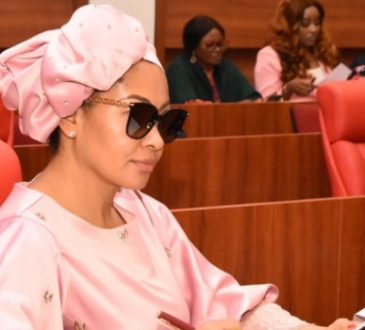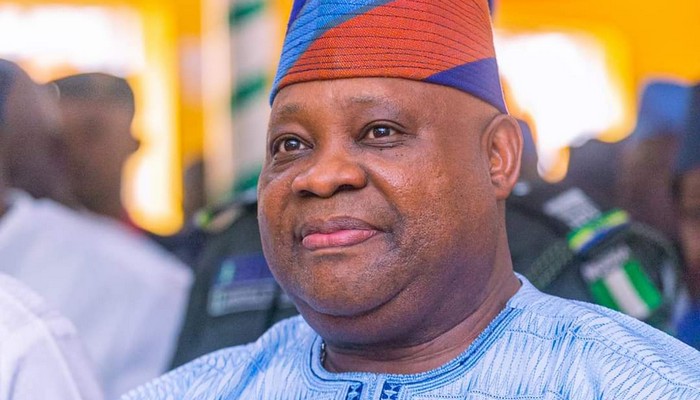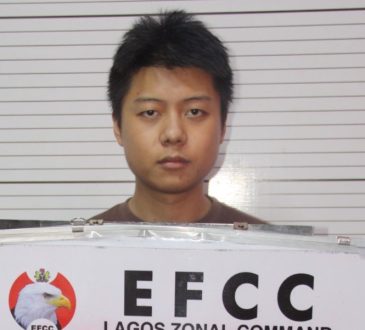
The European Election Observation Mission (EU EOM) to Nigeria on Tuesday the 27th of June, published its final report on the federal and state elections of 25 February and 18 March.
The Chief Observer, Barry Andrews, Member of the European Parliament, stated: “In the lead up to the 2023 general elections Nigerian citizens demonstrated a clear commitment to the democratic process. That said, the election exposed enduring systemic weaknesses and therefore signal a need for further legal and operational reforms to enhance transparency, inclusiveness, and accountability.”
Following a three-month-long observation across Nigeria, and in accordance with its usual practice, the EU EOM presented its findings and recommendations, disclosing that shortcomings in law and electoral administration hindered the conduct of well-run and inclusive elections and damaged trust in INEC.
With the aim of contributing to the improvement of future elections, the EU EOM offered 23 recommendations for consideration by the Nigerian authorities.
Barry Andrews said the Mission is particularly concerned about the need for reform in six areas which were identified as priority recommendations. It is the belief of the EU EOM that if implemented, could contribute to improvements for the conduct of elections.
The six priority recommendations point to the need to (1) remove ambiguities in the law, (2) establish a publicly accountable selection process for INEC members, (3) ensure real-time publication of and access to election results, (4) provide greater protection for media practitioners, address (5) discrimination against women in political life, and (6) impunity regarding electoral offenses.
Chief Observer, Barry Andrews, noted: “Importantly, there is a need for political will to achieve improved democratic practices in Nigeria. Inclusive dialogue between all stakeholders on electoral reform remains crucial. The European Union stands ready to support Nigerian stakeholders in the implementation of these recommendations.”
At the invitation of the Independent Electoral Commission of Nigeria, the EU EOM said it carried out its work between 11 January and 11 April. A delegation of the European Parliament joined the EU EOM for the observation of the Presidential and National Assembly elections.
The mission accredited a total of 110 observers from 25 EU Member States, as well as Norway, Switzerland, and Canada.
Below are the 23 recommendations made by the European Election Observation Mission.
- Protect the interests of voters through certainty of law for all stages and aspects of electoral processes by eliminating from electoral law and regulations errors and ambiguities to avoid potential for conflicting interpretations, and ensuring the revision processes are inclusive.
- Ensure institutional accountability by the timely inclusive consultation on
publication and dissemination of all election related laws, regulations and guidelines, and, upon enactment, make consolidated official legislation easily accessible to the public in hard copy and online via the INEC website.
- Establish a robust operational framework for the independence, integrity, and efficiency of electoral administration through an inclusive and publicly accountable mechanism for selecting candidates to the posts of INEC commissioners and RECs based on clear criteria of evaluation of merits, qualifications, and verified non-partisanship.
- Enhance capacity of electoral staff by revising procedures and subsequent training of the election supervisors, collation officers, and ad hoc polling staff addressing, in particular, the use of technologies, counting procedures, and the completion of polling unit results and collation forms.
- Ensure transparency and allow for public scrutiny of election technology by mandating in law timely disclosure of test and audit results, together with protocols, guidelines, methodology of implementation, procurement, and functionality details.
- Protect the free expression of the will of the voter and integrity of elections by establishing a robust, transparent, and easily verifiable results processing system with clear rules. These include uploading polling unit results from the polling unit only and in real time, at each level of collation results forms to be uploaded in real time and all forms to be published in an easily trackable and scrapable database format.
- Provide the opportunity to allow citizens attaining 18 years ahead of elections to register during the previous registration period.
- Establish a reliable basis for an inclusive and accurate voter register by undertaking a timel external independent audit of it including in person data checking, sample analysis, and biometric data quality assessment. The process to be followed by implementation of a clear protocol and guidelines for maintaining the register and should be publicly accountable.
- Remove unreasonable restrictions to the right to stand by curbing the charging of excessive fees for consideration as a candidate in party primary elections.
- Enforce INEC’s campaign regulations by establishing a robust and effective monitoring and sanctioning mechanism to curtail abuse of incumbency, including obstructions and interference by state-level authorities.
- Promote transparency and accountability in campaign finances by the introducing a mandatory requirement on political parties, candidates and third parties to operate pre-notified dedicated bank accounts for donations, revenues, and spending, subject to clear rules of accounting, reporting, and public disclosure before, during, and after campaigns with robust sanctions for noncompliance.
- Afford adequate protection to freedom of expression by developing a comprehensive operational framework underpinned by the skills and means for ensuring prompt investigation and prosecution of all types of attacks against media practitioners.
- Safeguard freedom of expression and transparency by ensuring the independence of National Broadcasting Commission in law and practice. This could be achieved by pre-selecting the NBC management through an open, inclusive, and competitive system, with a cross-party approval mechanism and/or participation of industry professionals, as well as by establishing clear institutional transparency and accountability requirements.
- Protect freedom of expression and pluralism by transforming the federal government owned media, the NTA and FRCN, into genuine public service broadcasters. This includes provisions for editorial independence, financial autonomy, clear separation from any government institution and an open and competitive preselection process of the management, with a crossparty approval mechanism and/or participation of industry professionals.
- To align with international and regional standards on freedom of expression, amend overly restrictive legislative provisions limiting this right in the media and online, including the vague definitions of “cyberstalking” in the 2015 Cybercrimes Act and of “classified matters” in the Official Secrets Act.
- Promote the independent formation of voters’ opinions and reduce the manipulative interference through legislative or regulatory measures, developed in an inclusive process involving all key stakeholders including civil society experts, to identify, assess and curtail harmful content while protecting freedom of expression.
- Undertake urgent and robust affirmative action to ensure meaningful women’s representation through special measures in line with the Beijing principles and the National Gender Policy to increase the representation of women as candidates and in elected office, further supported by cross-sectoral, intensified, and sustained capacity building and sensitisation to eliminate discrimination.
- Ensure genuine opportunity to vote for persons with disabilities, and the vulnerable through a conducive voting environment, enabling independent access and respect for the secrecy of the vote, as well as sufficient assistive devices during all categories of elections.
- Enhance the right to vote of internally displaced voters by issuing a clear timely operational framework evidenced by detailed information on key voter data, specified temporary special measures, polling unit locations, security arrangements, targeted voter education planning and the early publication of postelection evaluations.
- Ensure the public accountability of electoral authorities by guaranteeing in law the right of access of observers and media to all stages of elections and key electoral information, underpinned by timely and transparent accreditation processes and with targeted sanctions for obstruction, intimidation or violence.
- Enhance certainty for voters and candidates through completion of pre-election disputes well in advance of election days by adapting legal timelines, providing additional resources for adjudication, as well as consistently and concisely detailing and publishing decisions in a timely manner including online.
- Address impunity for electoral offences through robust, well defined, and effective interagency co-ordination governed by clear rules on non-partisanship, optimisation of resources, delivery of effective investigation and sanctioning, and provision of regular public consolidated information on outcomes.
23. Ensure immediate and easy access to key information of public interest. This includes result forms from all collation levels, and decisions on i) cancellations of polling unit results, ii) supplementary elections, iii) declaration of winners, iv) the creation






